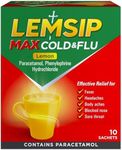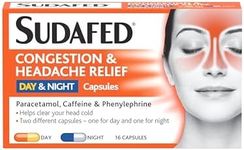Buying Guide for the Best Cold Flu Medicines
When choosing a cold or flu medicine, it's important to consider your specific symptoms and how they affect your daily life. Cold and flu medicines are designed to alleviate symptoms such as congestion, cough, sore throat, fever, and body aches. Understanding the active ingredients and their purposes can help you select the most effective product for your needs. Always read the labels carefully and consult with a healthcare professional if you have any underlying health conditions or are taking other medications.Active IngredientsActive ingredients are the components in the medicine that are responsible for treating your symptoms. Common active ingredients include acetaminophen for pain and fever, dextromethorphan for cough suppression, and pseudoephedrine for nasal congestion. It's important to choose a medicine with active ingredients that target your specific symptoms. If you have multiple symptoms, look for a combination product that addresses all of them. However, avoid taking multiple medications with overlapping active ingredients to prevent overdose.
FormulationCold and flu medicines come in various formulations such as tablets, capsules, liquids, and powders. The choice of formulation can affect how quickly the medicine works and how easy it is to take. Liquids and powders may work faster as they are absorbed more quickly, while tablets and capsules are convenient for on-the-go use. Consider your lifestyle and preferences when choosing a formulation. If you have difficulty swallowing pills, a liquid or powder might be a better option.
Duration of ActionThe duration of action refers to how long the medicine will provide relief from symptoms. Some medicines offer short-term relief and need to be taken every 4-6 hours, while others are designed for extended relief and can be taken every 12-24 hours. If you need consistent symptom control throughout the day, a longer-acting medicine might be more convenient. However, if you only experience symptoms at certain times, a shorter-acting medicine may be sufficient.
Side EffectsAll medications can have side effects, and cold and flu medicines are no exception. Common side effects include drowsiness, dizziness, dry mouth, and upset stomach. It's important to be aware of potential side effects, especially if you need to drive or operate machinery. If you are sensitive to certain side effects, look for medicines labeled as 'non-drowsy' or consult with a healthcare professional for alternatives. Always weigh the benefits of symptom relief against the potential for side effects.
Age and Health ConsiderationsDifferent cold and flu medicines are formulated for different age groups and health conditions. Some medicines are not suitable for children, the elderly, or individuals with certain health conditions such as high blood pressure or diabetes. Always check the label for age recommendations and warnings. If you have any health concerns or are taking other medications, consult with a healthcare professional to ensure the medicine is safe for you.















